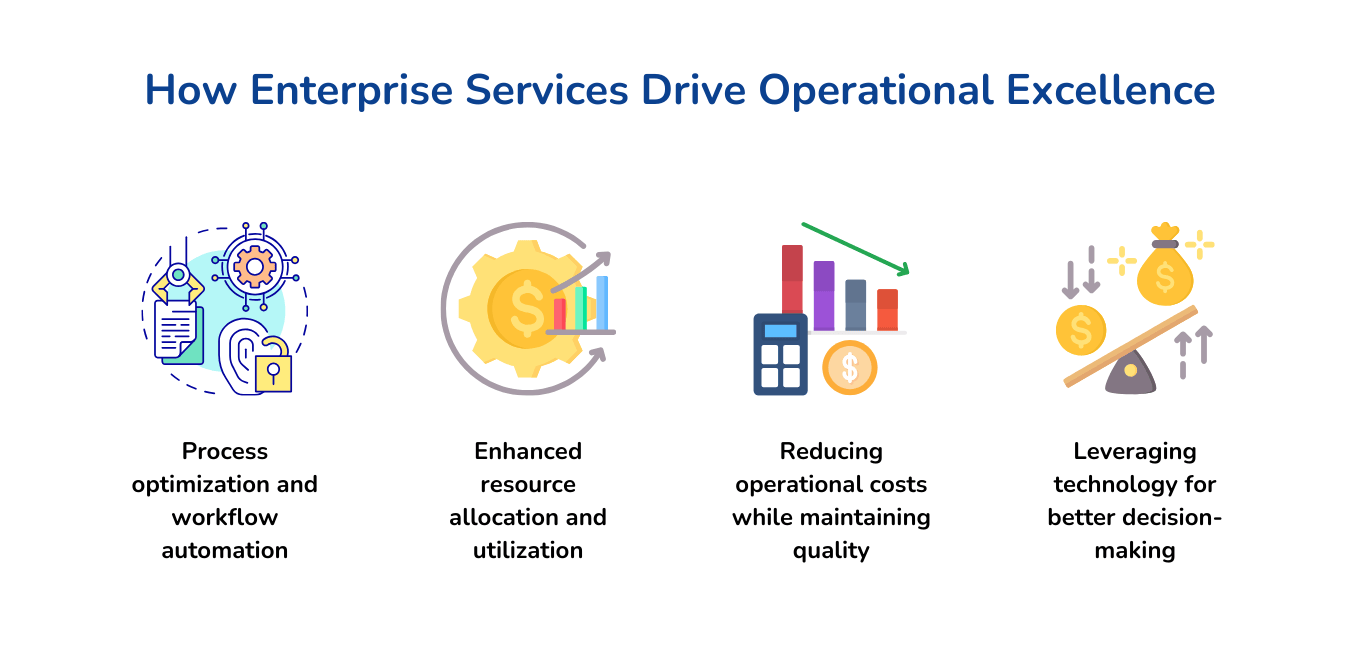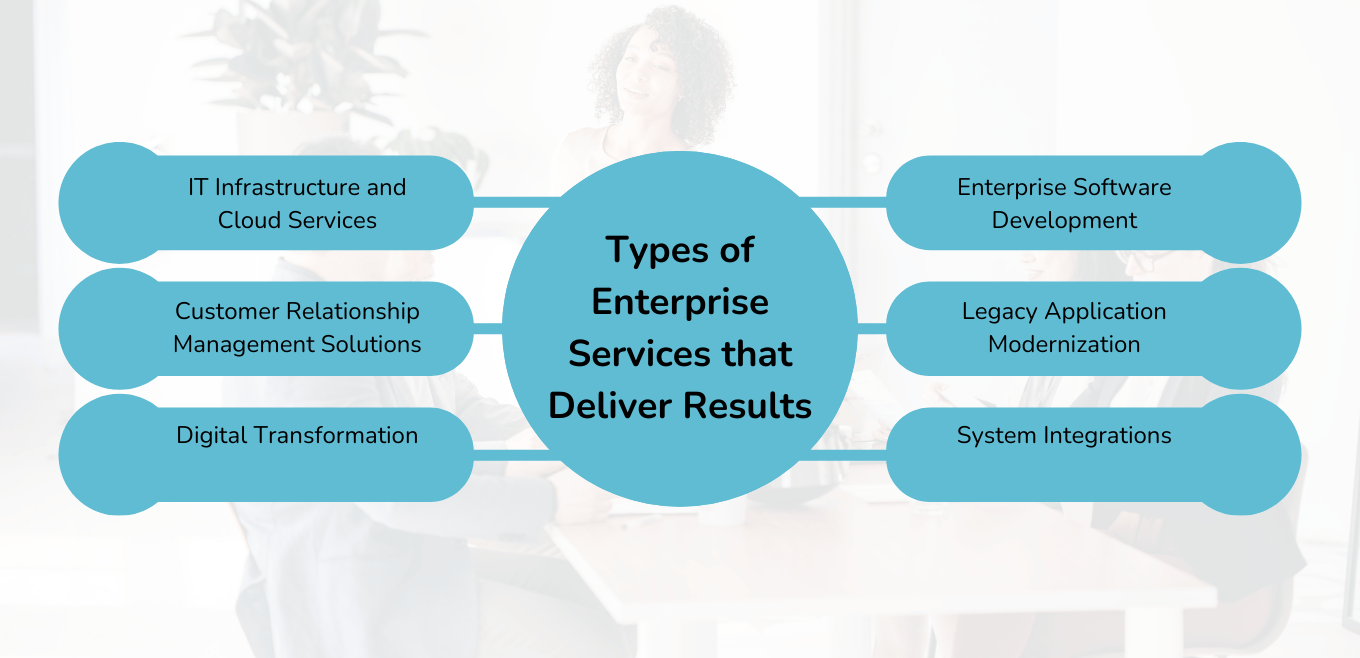Have you ever wondered how some businesses stay ahead in today’s fast-paced digital world? The secret often lies in how efficiently they run their operations. This is where enterprise services come into play. Businesses can streamline processes, improve productivity, and unlock new growth opportunities by leveraging tools like enterprise applications and customized enterprise solutions.
In an era of rapid technological advancement, relying on outdated systems can hold businesses back. Enterprise services go beyond fixing inefficiencies—they help organizations innovate and evolve. For example, legacy application modernization transforms outdated systems into agile and scalable solutions, enabling businesses to stay competitive.
But why does operational efficiency matter so much? Because it directly fuels growth. When businesses reduce bottlenecks, automate workflows, and make data-driven decisions through solutions like enterprise software development, they create a foundation for long-term success. Enterprise services don’t just enhance operations—they pave the way for innovation, scalability, and sustainable growth.
How Enterprise Services Drive Operational Excellence

Operational excellence isn’t just about working harder—it’s about working smarter. Enterprise services offer businesses the tools and strategies to streamline their operations, optimize resources, and deliver consistent results. Let’s break down how these services make a tangible difference.
Process optimization and workflow automation
Manual processes often slow businesses down, leading to inefficiencies and errors. Automating workflows enables businesses to complete tasks faster and with greater accuracy. Whether it’s automating routine approvals or integrating systems to eliminate redundancies, the focus is on making processes seamless and scalable. This not only improves efficiency but also allows teams to focus on high-value activities that drive innovation.
Enhanced resource allocation and utilization
Businesses must manage resources—whether people, technology, or finances—wisely to maximize impact. Enterprise services help businesses allocate resources where they’re needed most, ensuring optimal utilization. For example, advanced systems can identify underused assets or reassign workloads to prevent burnout, creating a balanced and productive environment.
Reducing operational costs while maintaining quality
Cutting costs shouldn’t mean cutting corners. Enterprise services help businesses identify cost-saving opportunities without compromising on quality. By automating time-consuming tasks, modernizing outdated systems, and reducing errors, organizations can lower expenses while delivering consistent, high-quality outcomes. The result? A leaner operation that still meets or exceeds customer expectations.
Leveraging technology for better decision-making
Data is only as valuable as the insights you draw from it. Enterprise services empower businesses to make better decisions by providing access to real-time data and analytics. Leaders use these tools to monitor performance, identify trends, and make informed choices that align with their goals. Whether it’s improving customer experiences or refining operational strategies, data-driven decisions give businesses a competitive edge.
By focusing on these key areas, enterprise services don’t just enhance operations—they transform them, laying the foundation for sustainable growth and success.
How Enterprise Services Foster Business Growth
Growth is the ultimate goal for any business, but achieving it requires more than ambition—it demands the right tools and strategies. Enterprise services provide the foundation businesses need to scale effectively, innovate continuously, and stay resilient in an ever-changing market.
Supporting scalability and market expansion
Growing businesses often face the challenge of scaling their operations while maintaining efficiency. Enterprise services enable scalability by offering flexible solutions like enterprise applications that adapt to changing demands. Whether it’s managing a larger workforce, entering new markets, or handling increased customer interactions, these services ensure businesses can expand without missing a beat.
Driving innovation and competitive differentiation
Staying competitive means constantly innovating. Enterprise services empower businesses to explore new ideas, develop cutting-edge products, and offer enhanced customer experiences. From enterprise software development that supports faster product rollouts to solutions that streamline research and development, these tools position businesses as leaders in their industries.
Building resilient and future-ready organizations
The ability to withstand disruptions and adapt to changes is critical for long-term growth. Through strategies like legacy application modernization, enterprise services help businesses replace outdated systems with agile, future-ready solutions. This ensures that organizations are not only prepared for current challenges but are also equipped to capitalize on emerging opportunities.
By focusing on scalability, innovation, and resilience, enterprise services go beyond operational improvements—they create pathways for sustainable growth and enduring success.
Types of Enterprise Services that Deliver Results


Enterprise services come in many forms, each tailored to address specific business needs. By combining cutting-edge technology with strategic solutions, these services help organizations achieve measurable outcomes. Let’s explore some key types of enterprise services that deliver tangible results.
IT Infrastructure and Cloud Services
Modern businesses need robust and scalable IT infrastructure to operate efficiently. From setting up on-premise systems to adopting cloud-based platforms, IT infrastructure and cloud services ensure businesses have the flexibility and reliability they need. These services improve accessibility, enhance security, and reduce operational overhead, making them essential for both day-to-day operations and long-term growth.
Customer Relationship Management (CRM) Solutions
Strong customer relationships are at the heart of every successful business. CRM solutions help manage and enhance these relationships by centralizing customer data, automating communications, and providing insights into customer behavior. With these tools, businesses can personalize interactions, improve customer satisfaction, and drive loyalty.
Digital Transformation
Digital transformation is about more than adopting new technology—it’s about reimagining how businesses operate. Enterprise services enable digital transformation by modernizing workflows, automating repetitive tasks, and integrating advanced technologies like AI and analytics. This ensures businesses can adapt quickly to market changes and maintain a competitive edge.
Enterprise Software Development
Every business is unique, and off-the-shelf software solutions may not always meet their needs. Enterprise software development offers custom solutions tailored to specific business requirements. Whether it’s creating tools for internal operations or customer-facing platforms, these services ensure businesses have the technology they need to succeed.
Legacy Application Modernization
Outdated systems can be a significant roadblock to efficiency and growth. Legacy application modernization transforms these systems into agile, scalable solutions that align with modern business requirements. This not only reduces maintenance costs but also ensures compatibility with newer technologies.
System Integrations
Fragmented systems can lead to inefficiencies and data silos. System integrations bring these systems together, creating a unified platform where data flows seamlessly. This improves collaboration, enhances decision-making, and streamlines operations, ensuring businesses can work smarter, not harder.
By leveraging these diverse enterprise services, businesses can tackle their most pressing challenges and unlock new opportunities for success.
Key Considerations When Adopting Enterprise Service
Adopting enterprise services is a strategic decision that can transform your business operations and growth trajectory. However, to maximize their potential, it’s essential to approach the adoption process thoughtfully. Here are key considerations to guide your journey.
Evaluating business needs and priorities
Before diving into enterprise services, take a close look at your organization’s specific needs. Are you looking to improve operational efficiency, enhance customer experiences, or support digital transformation? Conducting a thorough assessment helps identify gaps and prioritize services that align with your goals. For instance, if scalability is a priority, consider cloud services or enterprise applications designed for dynamic environments.
Choosing the right service providers
The right partner can make all the difference. Look for service providers with proven expertise in areas such as enterprise software development, legacy application modernization, and system integrations. Evaluate their track record, client testimonials, and ability to customize solutions based on your unique requirements. A trusted provider not only delivers solutions but also offers ongoing support to ensure long-term success.
People10 has a rich history of empowering businesses through innovative and customized enterprise services. From modernizing legacy systems to building robust enterprise applications, we partner with organizations to achieve operational efficiency and drive measurable outcomes. Our commitment to excellence ensures that we not only deliver solutions but also enable long-term value and scalability for our clients.
Balancing costs with ROI
While cost is an important factor, the value delivered by enterprise services should take precedence. Assess the potential return on investment (ROI) by considering long-term benefits such as improved productivity, reduced operational costs, and increased revenue. For example, automating workflows may require upfront investment but can lead to significant savings and efficiency gains over time.
Ensuring seamless integration with existing systems
Adopting enterprise services shouldn’t disrupt your current operations. Focus on solutions that integrate seamlessly with your existing infrastructure, minimizing downtime and ensuring a smooth transition. This is especially crucial for legacy application modernization and system integrations, where compatibility is key to success.
Fostering Employee Adoption and Training
Introducing new services and tools often requires a cultural shift within the organization. Invest in employee training programs to ensure teams understand and embrace the changes. When employees are confident in using new technologies like enterprise applications, the chances of successful adoption increase significantly.
Prioritizing security and compliance
As businesses adopt more digital solutions, data security and compliance become critical. Ensure that the services you choose adhere to industry standards and regulations. Whether it’s securing sensitive customer data or maintaining compliance in heavily regulated industries, prioritizing security helps build trust and protect your business from risks.
Planning for scalability and future growth
Choose services that can grow with your business. Scalable solutions like cloud services and enterprise applications allow you to adapt to changing demands without frequent overhauls. This ensures that your investment remains relevant as your business evolves.
By considering these factors, businesses can make informed decisions when adopting enterprise services, ensuring they achieve their desired outcomes while staying aligned with their long-term goals.
Measuring the Impact of Enterprise Service
Implementing enterprise services is just the beginning; measuring their impact ensures you’re achieving the desired results. A structured approach to evaluation can highlight successes and areas for improvement, keeping your organization on the path to growth and efficiency.
Setting KPIs for efficiency and growth
Key Performance Indicators (KPIs) are essential for tracking the effectiveness of enterprise services. Metrics such as reduced downtime, faster project delivery, and cost savings can reflect operational efficiency. For growth, monitor indicators like market expansion, customer acquisition rates, and revenue growth. These KPIs provide actionable insights to ensure your enterprise services are aligned with your goals.
Tools and techniques for continuous monitoring
Modern tools like enterprise dashboards and real-time analytics platforms are invaluable for tracking performance. These solutions help visualize trends, monitor operations, and predict outcomes. By continuously analyzing this data, businesses can make informed decisions, optimize workflows, and ensure their enterprise services are delivering maximum value.
Learning from feedback and iterating for better results
Organizations regularly review feedback from employees, customers, and stakeholders to identify gaps and opportunities for improvement. Incorporating this feedback ensures your strategies evolve in step with changing business needs.
The Future of Enterprise Services
As technology evolves, so do enterprise services. Businesses explore emerging trends in enterprise solutions to remain competitive.
Emerging trends in enterprise solutions
From cloud-native platforms to hyper-personalized enterprise applications, the future of enterprise services lies in innovative, agile solutions. Businesses that adopt these advancements will be better equipped to adapt to market changes and seize new opportunities.
Role of AI, ML, and Automation in driving further efficiency
Artificial intelligence (AI), machine learning (ML), and automation are redefining enterprise solutions. These technologies enable smarter decision-making, predictive analytics, and the automation of repetitive tasks, freeing up resources for strategic initiatives.
Preparing for the next wave of growth
Enterprise services are not static; they evolve with business needs. Preparing for the next wave means investing in scalable solutions, nurturing a culture of innovation, and maintaining a forward-thinking mindset to stay competitive in a rapidly changing landscape.
Conclusion: A Blueprint for Success with Enterprise Services
Enterprise services have become a cornerstone of modern business success, driving operational excellence and fostering growth through streamlined processes, enhanced resource management, and innovative technology adoption. By setting clear KPIs, leveraging cutting-edge tools, and staying ahead of emerging trends like AI, ML, and automation, businesses can unlock their full potential and remain competitive in an ever-evolving market. The journey to achieving excellence with enterprise services is not just about adopting solutions—it’s about continuously refining them to align with your unique goals and challenges.
At People10, we are committed to empowering businesses with tailored enterprise services that deliver measurable results. From modernizing legacy systems and developing custom software solutions to enabling seamless system integrations, we bring deep expertise and innovation to every partnership. Our focus is on creating scalable, future-ready solutions that drive sustainable growth and operational efficiency. Let us help you navigate your enterprise transformation and achieve excellence in every facet of your business.
Ready to Transform Your Business?
Learn how People10’s tailored enterprise solutions can drive operational excellence and sustainable success.
Author
Nandakumar excels in delivering diverse solutions from mobile apps to complex enterprise systems. At People10, he continues to drive success with a focus on customer satisfaction and innovative technology solutions.




